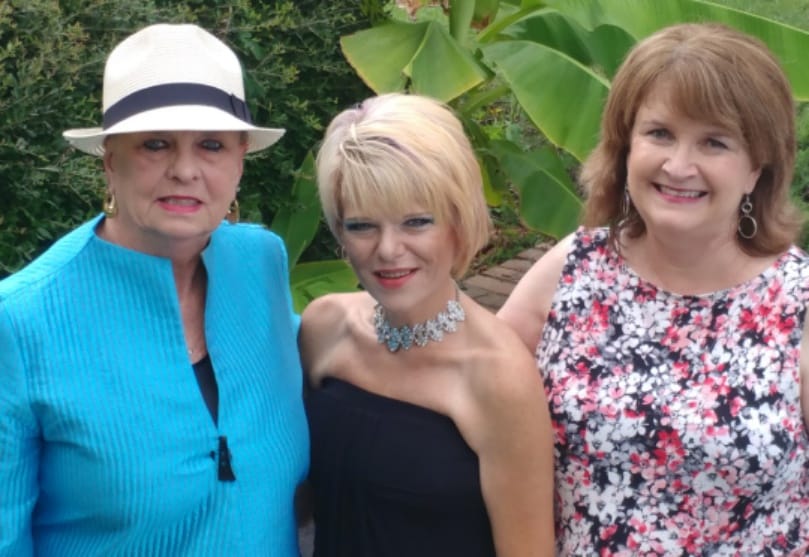Family with Rare Cancer Syndrome Finds Hope at UAMS
| Aug. 7, 2017 | It was a normal day visiting her family in Little Rock when Melinda Godsey started to feel sick. “I thought I had a stomach virus,” she said. Not wanting to infect her grandchildren, she got up the next morning and started the drive back to her home in El Dorado.
Feeling weaker and weaker as the two-hour trip progressed, Godsey, an interior designer and artist, recalls the frightening moment when she passed out behind the wheel. “It was quick. I just faded in and out. Thankfully I didn’t cross any lanes of traffic,” she said.
Her weakness continued to progress over the next three days, getting to the point where she could not shower or speak. After being admitted to the hospital, doctors found what looked to be the cause of her weakness: Severe bleeding ulcers in her stomach had resulted in a significant loss of blood.
However, that was not the end of their findings. Tests also revealed that the ulcers were merely a symptom of a much larger problem that had likely been growing for months. Godsey was told that she was living with linitis plastica, a rare stomach cancer that spreads to the muscles of the stomach wall, causing it to harden and become rigid. While this aggressive cancer starts in the stomach, it quickly spreads to other organs, making treatment options limited and complex.
While this diagnosis was about to change Godsey’s life, she did not yet know the impact it would have on her loved ones as well.
Representing from 5 percent to 10 percent of all gastric cancers, a slight increase in cases of linitis plastic has been observed over the past few years. This may be attributed to improved diagnostic tools, said Luidmila Schafer, M.D., a medical oncologist and assistant professor in the UAMS College of Medicine Department of Internal Medicine.
“Our knowledge and ability to diagnose rare cancers has improved significantly in recent years, so conditions such as linitis plastica may not have been diagnosed with such precision in the past,” she said.
Godsey was referred by her physician in El Dorado to a cancer center out of state, where she immediately went for evaluation. After confirming her diagnosis, she was given the news that the cancer had already spread to her abdomen and the preferred surgical treatment was no longer an option. However, she was a candidate for aggressive chemotherapy.
Because her out-of-state physician received his fellowship training in the UAMS Hematology/Oncology Fellowship program, he was aware of the UAMS Winthrop P. Rockefeller Cancer Institute and its comprehensive treatment programs. He told Godsey that she could return to Arkansas and receive chemo at the Cancer Institute close to home.
Referrals were made and Godsey arrived for her first appointment at UAMS in June, about one month after her diagnosis. Unfortunately, good news did not await her. Godsey had developed sepsis as the result of an infection, resulting in a week-long hospitalization and postponement of the start of chemotherapy.
“It was a tough start,” said Godsey’s daughter, Courtney Cassinelli, adding that after the infection cleared, her mom was able to begin two types of chemo given simultaneously under Schafer’s supervision.
While the treatment has been tough, Godsey is thankful for her good days and the time she’s been given.
“I could have lived for only a short time, but I’ve made it two years thanks to Dr. Schafer’s care. What she has done for me has been remarkable,” she said.
A Family Connection
At about the same time Godsey was coming to terms with her diagnosis of stage 4 stomach cancer in 2015, her first cousin, Anita Meek, was getting the news that she had been diagnosed with lobular breast cancer. This form of breast cancer makes up only about 10 percent of invasive breast cancers and typically doesn’t form a lump, making it less likely to be detected on a mammogram.
Having lost a young son to cancer, Meek, who lives in Harrison, decided to undergo genetic testing to see if there might be an inherited genetic component to their conditions. Schafer also had recommended that Godsey undergo genetic testing at the UAMS Cancer Genetics Clinic, due to the rarity of her cancer and the known link between linitis plastica and the CDH1 gene mutation.
“As the only cancer genetics clinic in Arkansas, we see people with rare cancers, early-onset cancers or unusual presentations of cancer from across the state and region,” said Kent McKelvey, M.D., director of Cancer and Adult Genetic Services and associate professor of family medicine and genetics in the UAMS College of Medicine.
UAMS has the only board-certified geneticists who diagnose, manage and treat complex cancer syndromes, of which there are more than 50. Cancer genetics counselors work with the geneticist and are a vital part of the team to help families understand their genome and its implications in cancer prevention.
Although any doctor can order genetic testing — which is conducted using a blood or saliva sample — the process can be daunting. Abnormal results must be put into context for a specific patient and family in this rapidly changing field and no two cases are the same.
When both Godsey and Meek were found to have the CDH1 gene mutation it only took minutes for McKelvey to conclude it was passed to them by their fathers, who were brothers.
“A person doesn’t inherit cancer from their parents. However, they can inherit the predisposition to cancer. That’s what happened in this family. The CDH1 gene mutation that Mrs. Godsey and Mrs. Meek have increases their risk of developing linitis plastica by about 80 percent and lobular breast cancer by about 40 percent,” McKelvey said.
There also is, to a lesser extent, an increased risk of colon cancer associated with CDH1.
Moving Forward
Armed with this information, Meek underwent a double mastectomy at a hospital near her Northwest Arkansas home and continues to be followed twice yearly at Highlands Oncology Group (HOG). The UAMS Cancer Institute and HOG formed a partnership in 2013 that provides expanded access to clinical trials and advanced treatment options to residents of Northwest Arkansas.
Because Godsey and Meek now knew they carried the CDH1 mutation, they also knew their adult children could choose to undergo genetic testing to determine if they had inherited it as well. When someone carries a gene mutation, they have a 50-50 chance of passing that mutation along to each of their children.
“My sister and I were both tested at UAMS. My test came back negative, but hers was positive,” said Cassinelli. Because Cassinelli does not carry the gene mutation, there is no need to test her children. Once the line is broken, it does not reappear in subsequent generations.
As for Kelly Cameron, Godsey’s eldest daughter, the positive result set in motion a series of completely unexpected and life-changing decisions.
Because there is no screening method for stomach cancer, it is often found in its late stages after it has already spread to other organs, which was the case with Godsey. The only way to prevent a person with the CDH1 gene mutation from developing stomach cancer is to undergo a procedure called total gastrectomy, which involves removing the stomach and extending the small intestine up to meet the esophagus. With time, the small intestine makes a small pouch mimicking the stomach.
Because food now passes directly into the small intestine when it is consumed, side effects such as bloating, nausea, vomiting, cramps and diarrhea following total gastrectomy are common in the first few months.
“Although it is possible to adjust to the new diet and small meals required following total gastrectomy, the surgery also has an impact on a person’s physical, social and emotional health,” Schafer said.
Due to her young age and the high likelihood that she would develop this rare cancer in her lifetime, the 41-year-old Cameron decided that, regardless of the side effects, total gastrectomy was her best option.
While it has been a challenging transition since her surgery in February 2016, each month become a little bit easier for Cameron. “The first year is traumatic to your body. Your stomach is a major player and suddenly it’s gone. You can’t fully understand what that’s like unless you experience it yourself,” she said.
Ultimately, however, the body adapts to its new situation and the symptoms subside. “It’s a new normal,” Cameron said, adding that she has essentially relearned how and what to eat, in addition to taking vitamin supplements that ensure she meets her daily nutritional needs.
Although Meek also is at risk of developing linitis plastica, she elected to forego total gastrectomy for now. “If I were younger, I may have chosen that path as well. Instead, I’m seeing my doctor regularly and hoping that any signs of cancer will be found early,” she said.
Additional Prevention
While still adjusting to her total gastrectomy, Cameron also chose in December 2016 to undergo a bilateral prophylactic mastectomy by having both breasts removed before there was any evidence of cancer.
According to the National Cancer Institute, this surgery will reduce her risk of developing breast cancer by at least 95 percent. The surgery was performed in December 2016 by V. Suzanne Klimberg, M.D., who was then director of the UAMS Breast Cancer Program. She will soon finish the breast reconstruction process.
Cameron is thankful the surgical options were presented to her by McKelvey after completing her genetic test.
“He was a straight shooter. He told me exactly what I needed to do if I wanted to eliminate the chance of developing these cancers,” she said.
She also is thankful to have gone ahead with the surgeries at a young age, as the total gastrectomy revealed stage 1 cancer already formed in the lining of her stomach, as well as precancerous cells in one breast.
“If not for that genetic test and Dr. McKelvey’s guidance, I would have had a much earlier onset of disease than my mom did. Knowing my genetic makeup saved my life,” she said.
Next Steps
Now that her surgeries are complete, next on Cameron’s list is yearly colonoscopies at UAMS to screen for early signs of colon cancer. “Thankfully there is a successful screening method for colon cancer, so no preventative surgery is needed there,” she said.
Then, after her son turns 18, he will have the opportunity to undergo genetic testing at UAMS for the CDH1 gene mutation and make his own decisions based on those findings. Some of Godsey’s siblings and other relatives also have agreed to undergo testing to see if they carry the gene and may have passed it to their children.
In addition to providing individuals with knowledge about their personal health risks, genetic tests also assist researchers in better understanding cancer syndromes in the future.
“Our ability to diagnose and understand cancer and other genetic syndromes is changing on a weekly basis. Because of this, we need the ability to bank and store individual genomes and tumor samples that can be compared and analyzed for a better understanding of how these syndromes work. As more samples are documented, our knowledge will continue to grow,” said McKelvey.
Godsey and Cameron agree they found the right place to address their complex medical needs.
“The Cancer Institute at UAMS has been wonderful. They’ve treated me not only like a patient, but more like a friend. Members of the staff have even called to check on me at home. I would never go anywhere but UAMS,” Cameron said.
A portion of the net proceeds for the Winthrop P. Rockefeller Cancer Institute’s 2017 Gala for Life will benefit the UAMS Cancer Genetics Program. To learn more, visit TheGalaforLife.com.


